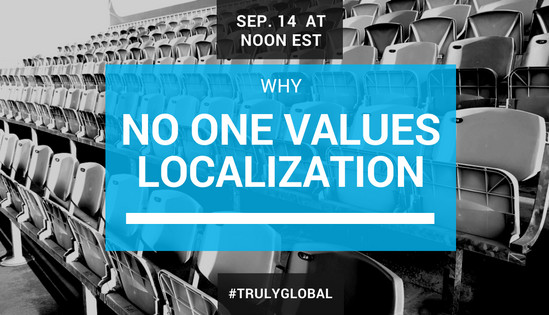
Why Localization Does Not Get The Love
Let’s face it: No one really cares for localization that much. Not in the EU, absolutely not in most of Asia (maybe except Japan), not in the US.
CEOs across the planet could not care less about localization or translation. When they do support it, then only because it’s a legal or customer requirement that they would rather circumvent if they could.
That’s why Anna Schlegel advises in her book ‘Truly Global’ that ‘executives and managers will want to see metrics at some point. They might not know what they want to see, but they will ask, specifically if changes, , new investments, or cuts are coming.’
These are the only times the executive suite pays attention to localization. No one cares as much as language professionals.
Let's talk about it
NEXT WEEK, Anna and I will talk about this challenge in more detail LIVE on FACEBOOK on Wednesday next week September 14 at noon EST/16:00 CET.
It is also true that no one cares about anybody’s product or service in general. Not just localization.
People are not buying a product or because someone sells what need. People buy from someone who believes in what they themselves believe.
Otherwise, the Apple iPhone would have never made it. No one would buy an SUV in a city. And millions of parents would not have been tricked into believing that granola is actually healthy. Likewise, no one is waiting to learn why localization is important - not even your mother has the slightest interest in localization.
It is not because people are cruel or mean
They are just busy doing other things. Except, your mother might actually listen, because she loves you, not because she cares about localization.
When we understand that nobody wants to learn, read or hear about localization and its challenges - we give our mind the opportunity to frame localization differently.
We begin to understand that localization - as any business - is, above all, a transaction. Buyers two extremely valuable commodities, their time and money, in exchange for localization services.
In return, they must receive something worthy. Localization itself is only valuable when it achieves something bigger than itself.
For this means that localization must bring them money, physical and mental health, respect, sensuality, sense of belonging, or self-esteem. They may want to invent, build, design, work, compose, interpret, co-operate, plan, take care of something, or they need help.
In essence, they want personal security, financial security, health and well-being, fun, safety nets against accidents/illness and their adverse impacts.
If we want attention from important people, we will need to begin with their needs first and then hold us accountable for empathizing with the market.
We need to reverse engineer our argument
We need to start with WHY translation buyers should believe in what we believe. Let’s communicate concepts, not just facts. People forget facts, they remember stories.
Yes, we have got to know our profession and its statistics, we have got to stay on top of cutting edge trends, and we always want to share that wisdom with prospects and customers.
However, in doing so, we often appear as a group of people who believes that it is so smart and so talented for having solutions for being truly global that the world should really just stampede a path to their doorstep with their wallets wide open.
You and I know that this not happening. The world does not owe us anything. There is no magic industry association or business partner that’s going to materialize out of thin air and do all of this lowly marketing work for the localization profession. Even though they are trying.
A different approach
Let’s talk about our job as localization professionals and business owners to hustle our products and services. After all, it is our job to prove that our products and services are as amazing as they actually are; and that our services will actually solve other people’s problems and address their wants and desires.
Let’s talk about no putting the burden on the translation buyers to figure it out for themselves. How not get angry that localization is not recognized as much as we think it should.
Let’s have a conversation on how to keep it fun, interesting, and, yes, quirky.
Anna and I did so LIVE on FACEBOOK. Missed it? Kein Problem: Watch the recording here.
Certified Swedish/English Interpreter by the Legal, Financial and Administrative Services Agency (auktoriserad tolk av Kammarkollegiet)
7ySorry, but the biggest problem that our industry wrestles with is not buyer incompetence or ignorance, but the incompetence and ignorance of the self-professed professionals that contaminate this industry. People like yourself. This article is so incredibly poorly written that I cringe. Spelling mistakes, missing words, incorrect punctuation. No wonder potential clients say 'Thanks, but no thanks.'. Shame on you.
Trust Enabler | Digital Sales & Marketing | Corporate Sales Manager
7yin one word: reconnect or link to truly customer/people needs
Reducing your power bill & carbon footprint | born at 329 pp
7yI would have loved to see this opinion piece without the invitation to the Facebook talk. Although it isn't, to some people it might come across as bait.
Founder & CEO @ Nubuto | @ Dragoman | Technology Evangelist
7yI will join the talk. Thank you.
IT, Technical & Marketing Translation @ TradAustral Services, Mauritius & France
7yThanks Andrew for this new approach and for sharing the insights